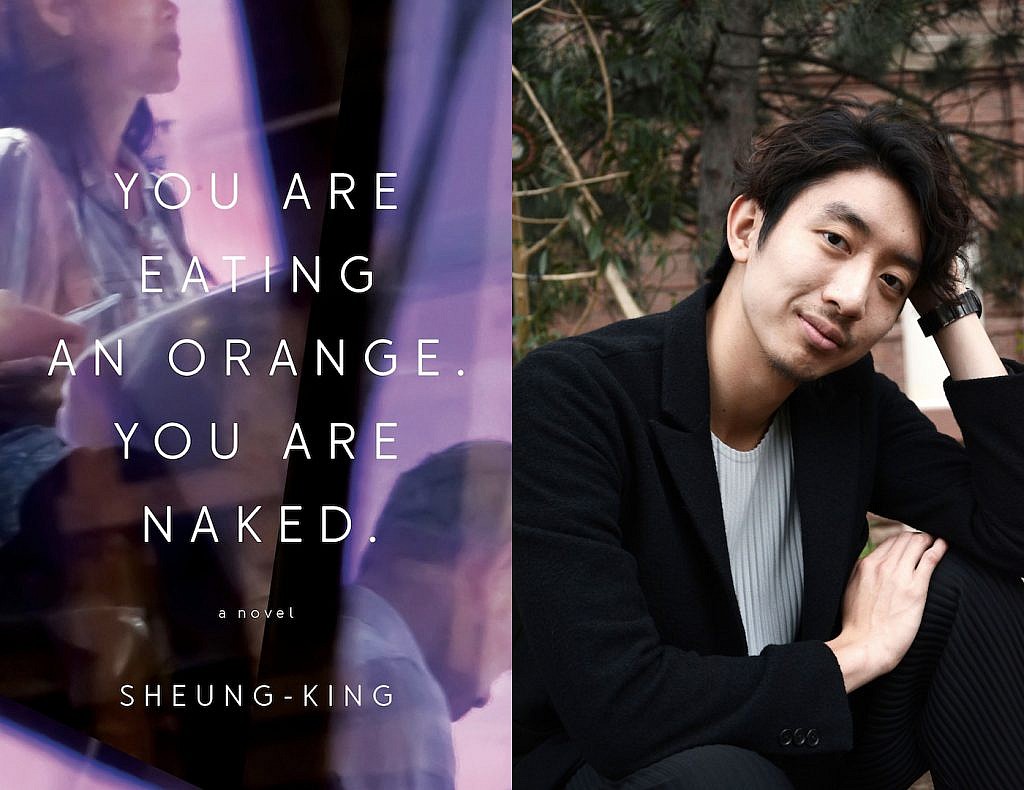In Conversation: Sheung-King

B*H: Why do you write?
SK: It’s an effective way to discuss ideas.
A new season means new conversations, or, rather, new In Conversations! We talked to some of our Fall 2020 authors about their forthcoming books, and about the essential but frequently elusive art of writing. For the next couple of months, we’ll be sharing their wit, their wisdom, and their work with you on the blog. You can also subscribe to the Book*hug Press e-newsletter or follow us on social media—we’re partial to Facebook, Instagram, and Twitter—for updates on upcoming author events. Happy fall, y’all.
Our conversation continues with Sheung-King, whose debut novel, You Are Eating an Orange. You Are Naked., celebrates its official publication today; congratulations! Thea Lim, author of An Ocean of Minutes (a finalist for the Scotiabank Giller Prize), calls Orange “a tale of two rich and rootless people that oozes the horror and confusion of love.” Although its surreal, filmic beauty is undeniable, Sheung-King’s debut offers more than aesthetic pleasure: Lim adds that the book “gives the cold shoulder to the dominant gaze and its demands to control the Asian body, carving out a thrilling space beyond whiteness.” Like Orange itself, Sheung-King’s answers to our questions speak to and against Orientalism, Eurocentrism, and colonialism, recalibrating a traditionally limited—and racist—narrative. We’re incredibly grateful for his perspective.
What are you currently writing?
I’m working on a collection of stories. I plan for all of them to be set in Tung Chung, a residential area next to the Hong Kong International Airport where frequent travelers and those who work at the airport often choose to live. Though the book is set in Hong Kong, my characters have a connection to Canada. For my next book, I plan on using the implications behind the development of artificial intelligence to comment on the current state of Hong Kong, post-colonialism, Orientalism, transnationalism, religion, and government structures. Much like my first novel, You Are Eating an Orange. You Are Naked., the themes I’m interested in will be explored indirectly, through romantic relationships between characters.
What are you currently reading?
I’ve been reading Liu Cixin’s The Three-Body Problem—one of the best science fiction series I’ve read. Liu combines cultural history, politics, storytelling traditions, and scientific research in a believable sci-fi setting. I just finished book two, The Dark Forest, and am very much looking forward to reading more.
I’m also reading Yukiko Motoya’s The Lonesome Bodybuilder (Picnic in the Storm), a hilarious collection of absurdist stories with sudden bursts of violence centred on the lives of contemporary women in Japan.
What book—or books—would you recommend to a new friend?
Yoko Tawada’s Where Europe Begins—one of the first transnational pieces of contemporary literatures I’ve read. Tawada, who speaks multiple languages and writes in both Japanese and German, navigates the liminal spaces between cultures brilliantly. Exploring themes of alienation, cultural displacement, Orientalism, and racism using a kind of surrealism that is sometimes grotesque, Tawada’s stories makes readers uncomfortable (in a good way).
What book—or books—would you recommend to an old friend?
Lizard by Banana Yoshimoto is one of the most non-judgmental and heart-warming collections of stories about the lives of ex-sex cult members that I know of (not that I can think of that many). I don’t think anyone other than Yoshimoto can pull something like this off.
Why do you write?
It’s an effective way to discuss ideas.
What do you write with?
Google Docs.
Do you drink tea, coffee, neither, or both?
Black coffee in the mornings and tea in the afternoons.
Do you have a preference for fiction, nonfiction, or poetry in your reading or writing?
I try to maintain a balance between fiction and nonfiction. I need to read more poetry.
Describe your favourite article of clothing.
A pair of black pants. The material is like that of dress pants, but the wide legs make them look kind of like a skirt when I put them on.
Tell us a very short story, or write a very short poem.
Me and the durian next to the bed are the only things that do not belong to this hotel room.
Tell us your favourite word, and why it’s your favourite.
The Chinese term for constipation: “便秘” (biàn bì). The word “便,” on its own, can mean, among many things, “easy,” “informal,” “ordinary,” and “comfort,” and “秘” can mean “secret.”
❧
As a bonus, please enjoy the following video, in which Sheung-King reads from You Are Eating an Orange. You Are Naked.
Sheung-King is a writer and educator. His work has appeared in PRISM International, The Shanghai Literary Review, and The Humber Literary Review, among others. He is currently a lecturer at the University of Guelph and Sheridan College. You Are Eating an Orange. You Are Naked. is Sheung-King’s debut book. Originally from Hong Kong, he lives in Toronto.

